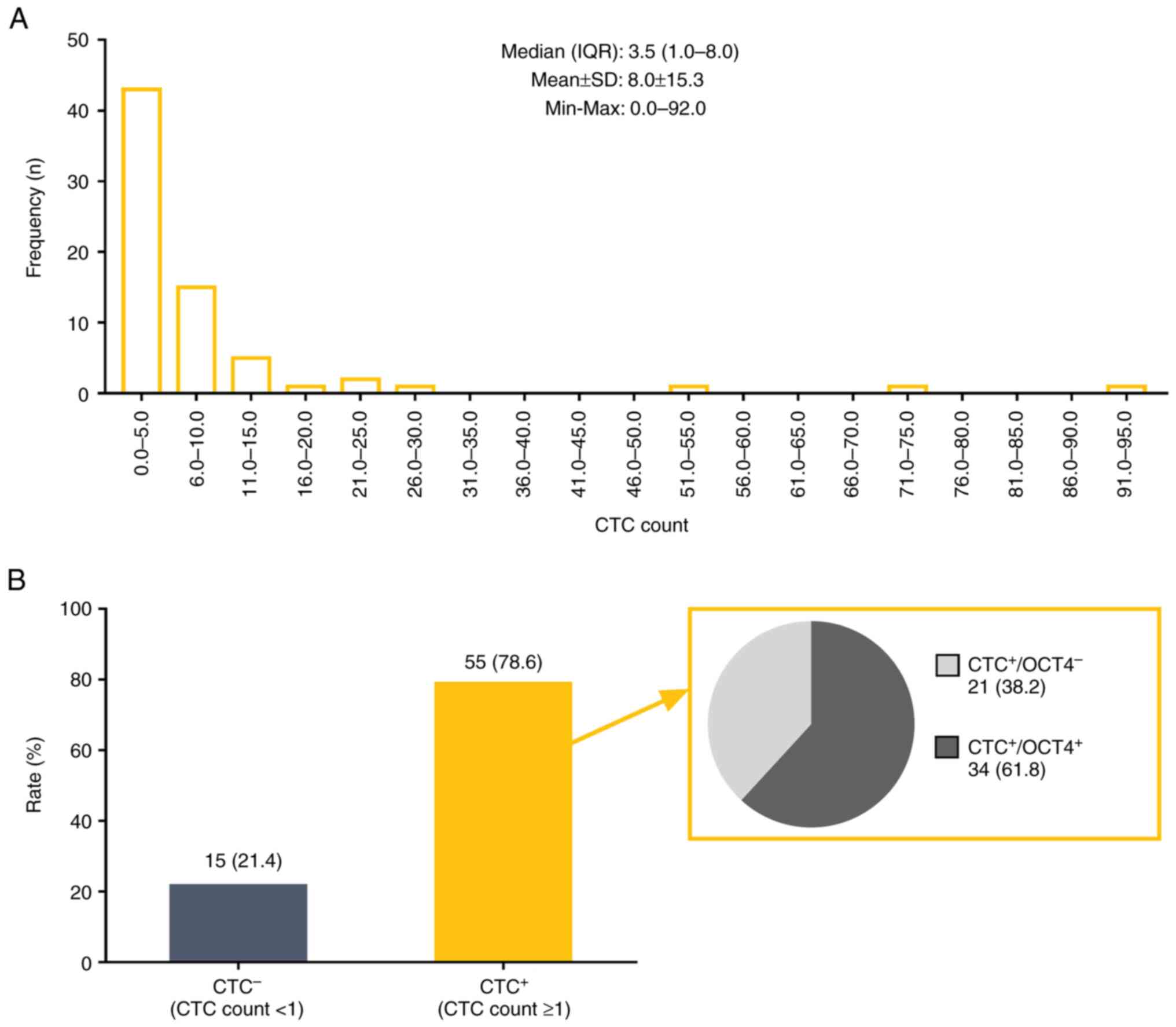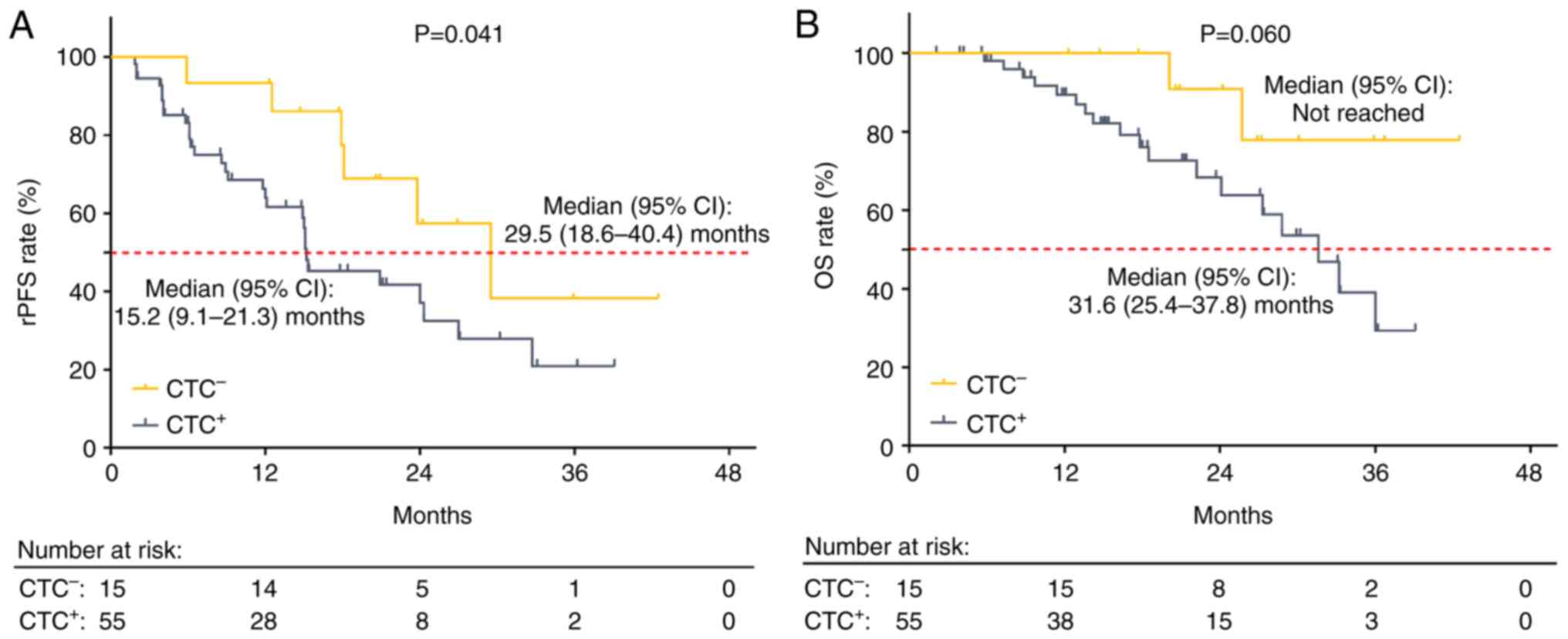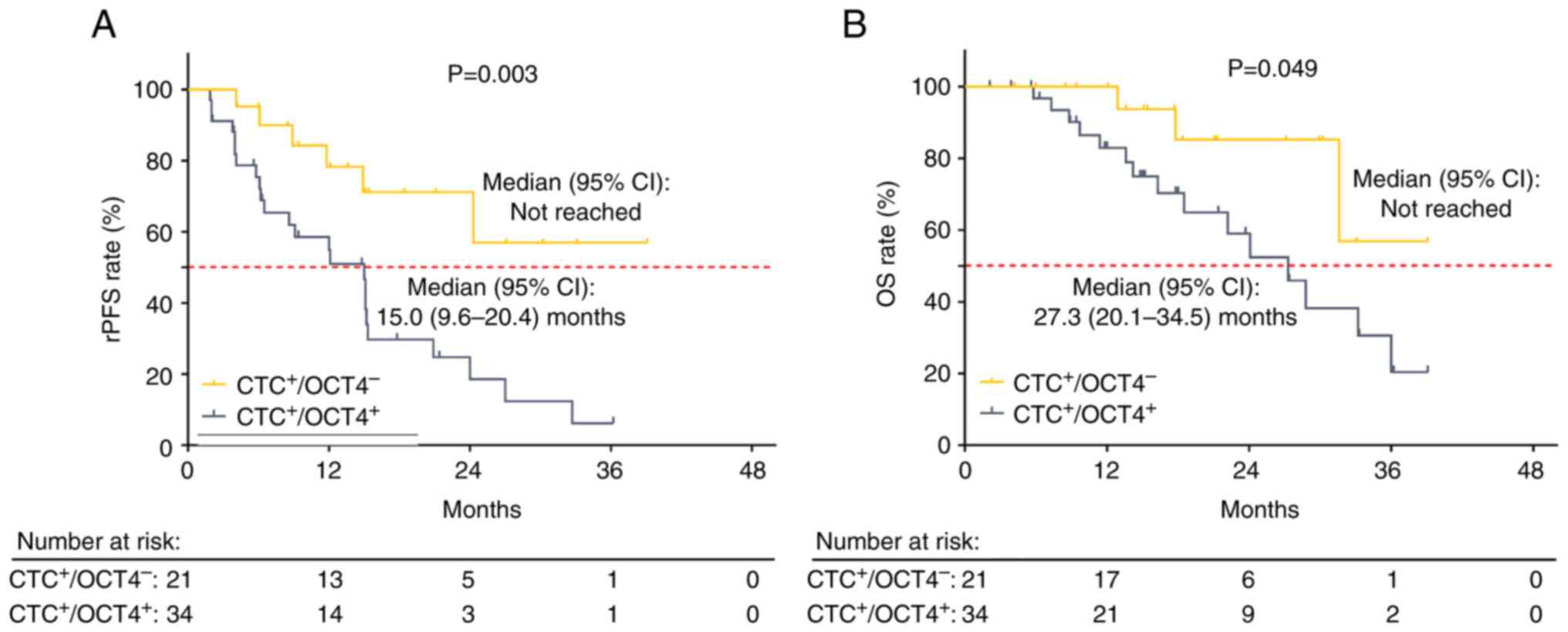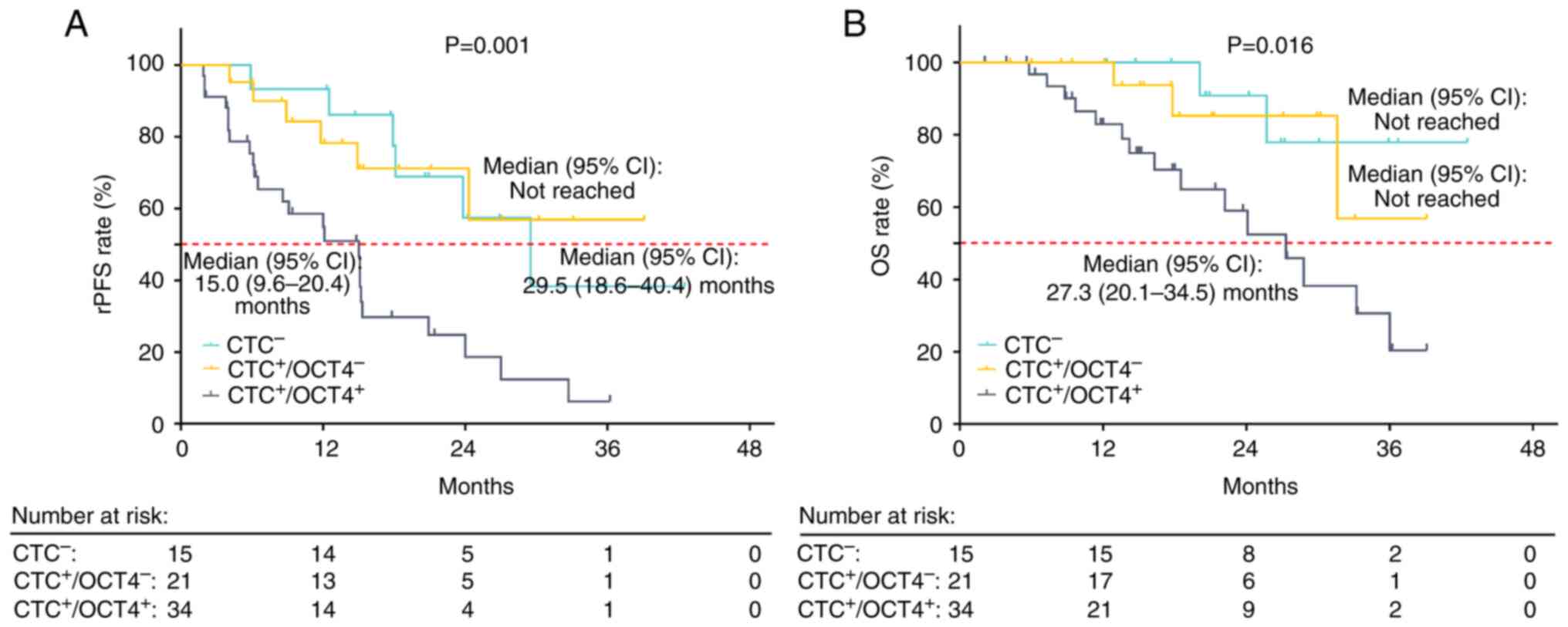|
1
|
Rebello RJ, Oing C, Knudsen KE, Loeb S,
Johnson DC, Reiter RE, Gillessen S, Van der Kwast T and Bristow RG:
Prostate cancer. Nat Rev Dis Primers. 7:92021. View Article : Google Scholar : PubMed/NCBI
|
|
2
|
Qiu H, Cao S and Xu R: Cancer incidence,
mortality, and burden in China: A time-trend analysis and
comparison with the United States and United Kingdom based on the
global epidemiological data released in 2020. Cancer Commun (Lond).
41:1037–1048. 2021. View Article : Google Scholar : PubMed/NCBI
|
|
3
|
Liu X, Yu C, Bi Y and Zhang ZJ: Trends and
age-period-cohort effect on incidence and mortality of prostate
cancer from 1990 to 2017 in China. Public Health. 172:70–80. 2019.
View Article : Google Scholar : PubMed/NCBI
|
|
4
|
Mansinho A, Macedo D, Fernandes I and
Costa L: Castration-resistant prostate cancer: Mechanisms, targets
and treatment. Adv Exp Med Biol. 1096:117–133. 2018. View Article : Google Scholar : PubMed/NCBI
|
|
5
|
Tucci M, Scagliotti GV and Vignani F:
Metastatic castration-resistant prostate cancer: Time for
innovation. Future Oncol. 11:91–106. 2015. View Article : Google Scholar : PubMed/NCBI
|
|
6
|
Henriquez I, Roach M III, Morgan TM, Bossi
A, Gómez JA, Abuchaibe O and Couñago F: Current and emerging
therapies for metastatic castration-resistant prostate cancer
(mCRPC). Biomedicines. 9:12472021. View Article : Google Scholar : PubMed/NCBI
|
|
7
|
Desai K, McManus JM and Sharifi N:
Hormonal therapy for prostate cancer. Endocr Rev. 42:354–373. 2021.
View Article : Google Scholar : PubMed/NCBI
|
|
8
|
de Bono JS, Logothetis CJ, Molina A,
Fizazi K, North S, Chu L, Chi KN, Jones RJ, Goodman OB Jr, Saad F,
et al: Abiraterone and increased survival in metastatic prostate
cancer. N Engl J Med. 364:1995–2005. 2011. View Article : Google Scholar : PubMed/NCBI
|
|
9
|
Pan J, Zhao J, Ni X, Gan H, Wei Y, Wu J,
Zhang T, Wang Q, Freedland SJ, Wang B, et al: The prevalence and
prognosis of next-generation therapeutic targets in metastatic
castration-resistant prostate cancer. Mol Oncol. 16:4011–4022.
2022. View Article : Google Scholar : PubMed/NCBI
|
|
10
|
Lin D, Shen L, Luo M, Zhang K, Li J, Yang
Q, Zhu F, Zhou D, Zheng S, Chen Y and Zhou J: Circulating tumor
cells: Biology and clinical significance. Signal Transduct Target
Ther. 6:4042021. View Article : Google Scholar : PubMed/NCBI
|
|
11
|
Castro-Giner F and Aceto N: Tracking
cancer progression: From circulating tumor cells to metastasis.
Genome Med. 12:312020. View Article : Google Scholar : PubMed/NCBI
|
|
12
|
Barnett ES, Schultz N, Stopsack KH, Lam
ET, Arfe A, Lee J, Zhao JL, Schonhoft JD, Carbone EA, Keegan NM, et
al: Analysis of BRCA2 copy number loss and genomic instability in
circulating tumor cells from patients with metastatic
castration-resistant prostate cancer. Eur Urol. 83:112–120. 2023.
View Article : Google Scholar : PubMed/NCBI
|
|
13
|
Chen Z, Wang J, Lu Y, Lai C, Qu L and Zhuo
Y: Ezrin expression in circulating tumor cells is a predictor of
prostate cancer metastasis. Bioengineered. 13:4076–4084. 2022.
View Article : Google Scholar : PubMed/NCBI
|
|
14
|
Scher HI, Heller G, Molina A, Attard G,
Danila DC, Jia X, Peng W, Sandhu SK, Olmos D, Riisnaes R, et al:
Circulating tumor cell biomarker panel as an individual-level
surrogate for survival in metastatic castration-resistant prostate
cancer. J Clin Oncol. 33:1348–1355. 2015. View Article : Google Scholar : PubMed/NCBI
|
|
15
|
Werner S, Stenzl A, Pantel K and
Todenhöfer T: Expression of epithelial mesenchymal transition and
cancer stem cell markers in circulating tumor cells. Adv Exp Med
Biol. 994:205–228. 2017. View Article : Google Scholar : PubMed/NCBI
|
|
16
|
Deng Z, Wu S, Wang Y and Shi D:
Circulating tumor cell isolation for cancer diagnosis and
prognosis. EBioMedicine. 83:1042372022. View Article : Google Scholar : PubMed/NCBI
|
|
17
|
Mohiuddin IS, Wei SJ and Kang MH: Role of
OCT4 in cancer stem-like cells and chemotherapy resistance. Biochim
Biophys Acta Mol Basis Dis. 1866:1654322020. View Article : Google Scholar : PubMed/NCBI
|
|
18
|
Iki K and Pour PM: Expression of Oct4, a
stem cell marker, in the hamster pancreatic cancer model.
Pancreatology. 6:406–413. 2006. View Article : Google Scholar : PubMed/NCBI
|
|
19
|
Villodre ES, Kipper FC, Pereira MB and
Lenz G: Roles of OCT4 in tumorigenesis, cancer therapy resistance
and prognosis. Cancer Treat Rev. 51:1–9. 2016. View Article : Google Scholar : PubMed/NCBI
|
|
20
|
Xie W, Yu J, Yin Y, Zhang X, Zheng X and
Wang X: OCT4 induces EMT and promotes ovarian cancer progression by
regulating the PI3K/AKT/mTOR pathway. Front Oncol. 12:8762572022.
View Article : Google Scholar : PubMed/NCBI
|
|
21
|
Li S, Chen Q, Li H, Wu Y, Feng J and Yan
Y: Mesenchymal circulating tumor cells (CTCs) and OCT4 mRNA
expression in CTCs for prognosis prediction in patients with
non-small-cell lung cancer. Clin Transl Oncol. 19:1147–1153. 2017.
View Article : Google Scholar : PubMed/NCBI
|
|
22
|
Zhang R, Xia J, Wang Y, Cao M, Jin D, Xue
W, Huang Y and Chen H: Co-expression of stem cell and epithelial
mesenchymal transition markers in circulating tumor cells of
bladder cancer patients. Onco Targets Ther. 13:10739–10748. 2020.
View Article : Google Scholar : PubMed/NCBI
|
|
23
|
Wang Q, Zhang JG and Wang W: Expression
and significance of S100P, CD147, and OCT4 in different prostate
cancer tissue TNM stages. Genet Mol Res. 14:6844–6851. 2015.
View Article : Google Scholar : PubMed/NCBI
|
|
24
|
Huang H, Wang C, Liu F, Li HZ, Peng G, Gao
X, Dong KQ, Wang HR, Kong DP, Qu M, et al: Reciprocal network
between cancer stem-like cells and macrophages facilitates the
progression and androgen deprivation therapy resistance of prostate
cancer. Clin Cancer Res. 24:4612–4626. 2018. View Article : Google Scholar : PubMed/NCBI
|
|
25
|
Vaddi PK, Stamnes MA, Cao H and Chen S:
Elimination of SOX2/OCT4-associated prostate cancer stem cells
blocks tumor development and enhances therapeutic response. Cancers
(Basel). 11:13312019. View Article : Google Scholar : PubMed/NCBI
|
|
26
|
Zhu Y, Ye D and Expert G: Chinese expert
consensus on the diagnosis and treatment of castration-resistant
prostate cancer (2019 update). Cancer Manag Res. 12:2127–2140.
2020. View Article : Google Scholar : PubMed/NCBI
|
|
27
|
Oken MM, Creech RH, Tormey DC, Horton J,
Davis TE, McFadden ET and Carbone PP: Toxicity and response
criteria of the eastern cooperative oncology group. Am J Clin
Oncol. 5:649–655. 1982. View Article : Google Scholar : PubMed/NCBI
|
|
28
|
Epstein JI: An update of the Gleason
grading system. J Urol. 183:433–440. 2010. View Article : Google Scholar : PubMed/NCBI
|
|
29
|
Epstein JI, Egevad L, Amin MB, Delahunt B,
Srigley JR and Humphrey PA; Grading Committee, : The 2014
international society of urological pathology (ISUP) consensus
conference on Gleason grading of prostatic carcinoma: Definition of
grading patterns and proposal for a new grading system. Am J Surg
Pathol. 40:244–252. 2016. View Article : Google Scholar : PubMed/NCBI
|
|
30
|
Wu S, Liu S, Liu Z, Huang J, Pu X, Li J,
Yang D, Deng H, Yang N and Xu J: Classification of circulating
tumor cells by epithelial-mesenchymal transition markers. PLoS One.
10:e01239762015. View Article : Google Scholar : PubMed/NCBI
|
|
31
|
Lindsay CR, Le Moulec S, Billiot F, Loriot
Y, Ngo-Camus M, Vielh P, Fizazi K, Massard C and Farace F: Vimentin
and Ki67 expression in circulating tumour cells derived from
castrate-resistant prostate cancer. BMC Cancer. 16:1682016.
View Article : Google Scholar : PubMed/NCBI
|
|
32
|
Lowes LE, Lock M, Rodrigues G, D'Souza D,
Bauman G, Ahmad B, Venkatesan V, Allan AL and Sexton T: The
significance of circulating tumor cells in prostate cancer patients
undergoing adjuvant or salvage radiation therapy. Prostate Cancer
Prostatic Dis. 18:358–364. 2015. View Article : Google Scholar : PubMed/NCBI
|
|
33
|
Eisenhauer EA, Therasse P, Bogaerts J,
Schwartz LH, Sargent D, Ford R, Dancey J, Arbuck S, Gwyther S,
Mooney M, et al: New response evaluation criteria in solid tumours:
Revised RECIST guideline (version 1.1). Eur J Cancer. 45:228–247.
2009. View Article : Google Scholar : PubMed/NCBI
|
|
34
|
Saad F, Efstathiou E, Attard G, Flaig TW,
Franke F, Goodman OB Jr, Oudard S, Steuber T, Suzuki H, Wu D, et
al: Apalutamide plus abiraterone acetate and prednisone versus
placebo plus abiraterone and prednisone in metastatic,
castration-resistant prostate cancer (ACIS): A randomised,
placebo-controlled, double-blind, multinational, phase 3 study.
Lancet Oncol. 22:1541–1559. 2021. View Article : Google Scholar : PubMed/NCBI
|
|
35
|
Chi KN, Rathkopf D, Smith MR, Efstathiou
E, Attard G, Olmos D, Lee JY, Small EJ, Pereira de Santana Gomes
AJ, Roubaud G, et al: Niraparib and abiraterone acetate for
metastatic castration-resistant prostate cancer. J Clin Oncol.
41:3339–3351. 2023. View Article : Google Scholar : PubMed/NCBI
|
|
36
|
Lorente D, Olmos D, Mateo J, Dolling D,
Bianchini D, Seed G, Flohr P, Crespo M, Figueiredo I, Miranda S, et
al: Circulating tumour cell increase as a biomarker of disease
progression in metastatic castration-resistant prostate cancer
patients with low baseline CTC counts. Ann Oncol. 29:1554–1560.
2018. View Article : Google Scholar : PubMed/NCBI
|
|
37
|
de Bono JS, Scher HI, Montgomery RB,
Parker C, Miller MC, Tissing H, Doyle GV, Terstappen LW, Pienta KJ
and Raghavan D: Circulating tumor cells predict survival benefit
from treatment in metastatic castration-resistant prostate cancer.
Clin Cancer Res. 14:6302–6309. 2008. View Article : Google Scholar : PubMed/NCBI
|
|
38
|
de Kruijff IE, Sieuwerts AM, Onstenk W,
Kraan J, Smid M, Van MN, van der Vlugt-Daane M, Hoop EO, Mathijssen
RHJ, Lolkema MP, et al: Circulating tumor cell enumeration and
characterization in metastatic castration-resistant prostate cancer
patients treated with cabazitaxel. Cancers (Basel). 11:12122019.
View Article : Google Scholar : PubMed/NCBI
|
|
39
|
Heller G, McCormack R, Kheoh T, Molina A,
Smith MR, Dreicer R, Saad F, de Wit R, Aftab DT, Hirmand M, et al:
Circulating tumor cell number as a response measure of prolonged
survival for metastatic castration-resistant prostate cancer: A
comparison with prostate-specific antigen across five randomized
phase III clinical trials. J Clin Oncol. 36:572–580. 2018.
View Article : Google Scholar : PubMed/NCBI
|
|
40
|
Scher HI, Armstrong AJ, Schonhoft JD, Gill
A, Zhao JL, Barnett E, Carbone E, Lu J, Antonarakis ES, Luo J, et
al: Development and validation of circulating tumour cell
enumeration (Epic Sciences) as a prognostic biomarker in men with
metastatic castration-resistant prostate cancer. Eur J Cancer.
150:83–94. 2021. View Article : Google Scholar : PubMed/NCBI
|
|
41
|
Kosaka T, Mikami S, Yoshimine S, Miyazaki
Y, Daimon T, Kikuchi E, Miyajima A and Oya M: The prognostic
significance of OCT4 expression in patients with prostate cancer.
Hum Pathol. 51:1–8. 2016. View Article : Google Scholar : PubMed/NCBI
|
|
42
|
Vasseur A, Kiavue N, Bidard FC, Pierga JY
and Cabel L: Clinical utility of circulating tumor cells: An
update. Mol Oncol. 15:1647–1666. 2021. View Article : Google Scholar : PubMed/NCBI
|
|
43
|
Lu Y, Zhu H, Shan H, Lu J, Chang X, Li X,
Lu J, Fan X, Zhu S, Wang Y, et al: Knockdown of Oct4 and Nanog
expression inhibits the stemness of pancreatic cancer cells. Cancer
Lett. 340:113–123. 2013. View Article : Google Scholar : PubMed/NCBI
|
|
44
|
Patra SK: Roles of OCT4 in pathways of
embryonic development and cancer progression. Mech Ageing Dev.
189:1112862020. View Article : Google Scholar : PubMed/NCBI
|
|
45
|
Komura K, Fujiwara Y, Uchimoto T, Saito K,
Tanda N, Matsunaga T, Ichihashi A, Tsutsumi T, Tsujino T, Yoshikawa
Y, et al: Comparison of radiographic progression-free survival and
PSA response on sequential treatment using abiraterone and
enzalutamide for newly diagnosed castration-resistant prostate
cancer: A propensity score matched analysis from multicenter
cohort. J Clin Med. 8:12512019. View Article : Google Scholar : PubMed/NCBI
|


















